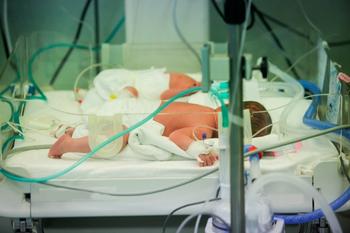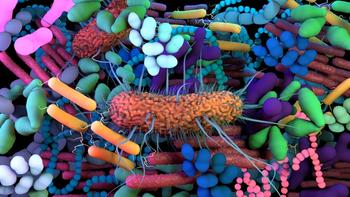
Discover how Mirvie’s RNA platform uses a simple blood test to detect fetal growth restriction early in pregnancy, allowing for proactive interventions and improved outcomes for mothers and babies.

Discover how Mirvie’s RNA platform uses a simple blood test to detect fetal growth restriction early in pregnancy, allowing for proactive interventions and improved outcomes for mothers and babies.

Nicola F. Tavella, MPH, dives into his team's research on postpartum depression and unplanned cesarean delivery, which was presented at SMFM's 2025 Pregnancy Meeting.

Discover how maternal fetal medicine specialists are tackling maternal mortality disparities through trust-building, diverse care teams, and comprehensive support programs.

Timely diagnosis of gestational diabetes is crucial for optimal maternal and fetal health, but a recent study highlights demographic disparities in screening delays and the need for further research on potential health impacts.

A new study links first-trimester hemorrhage and anemia to a higher placenta accreta spectrum risk, emphasizing early screening and non-traditional risk factors.

AI-assisted software improves clinicians' detection of congenital heart defects in prenatal ultrasounds, enhancing accuracy, confidence, and speed, according to a study presented at SMFM's Annual Pregnancy Meeting.

Daniel L. Kuhr, MD, maternal fetal medicine fellow at Mount Sinai, discusses the role of neighborhood-level indices in predicting spontaneous preterm birth risk and why individual patient characteristics remain the key factor.

A new randomized control trial reveals that barbed sutures significantly reduce blood loss during hysterotomy, offering valuable insights for improving clinical outcomes in obstetric surgery.

Researchers have identified higher concentrations of microplastics and nanoplastics in the placentae of infants born prematurely compared to those born at term, a new study finds.

A new study presented at the SMFM 2025 Pregnancy Meeting found that homicide and suicide are the leading causes of maternal death in the United States.

A new study explores the potential link between antiretroviral therapy, specifically integrase inhibitors, and fetal biometric measurements, shedding light on possible pregnancy complications.

Artificial intelligence-powered ultrasound analysis is enhancing the early detection of congenital heart defects, improving diagnostic accuracy, physician confidence, and neonatal outcomes.

In the study, investigators analyzed the Jada System in 800 patients from October 2020 to April 2022 across 16 hospitals in the United States. Results of the study were presented at the SMFM 43rd Annual Pregnancy Meeting in San Francisco, California.

A single oral dose of azithromycin in women in labor planning vaginal delivery significantly reduced the risk of maternal death and sepsis, according to study results presented at the SMFM 43rd Annual Pregnancy Meeting.

An oral concurrent session at SMFM’s 42nd Annual Pregnancy Meeting highlighted an analysis of pregnancy outcomes after optimal prenatal opioid use disorder care.

An oral presentation at the Society for Maternal-Fetal Medicine’s (SMFM) 42nd Annual Pregnancy Meeting explored possible associations with marijuana use and nausea and vomiting in early pregnancy.

An oral abstract presentation at SMFM’s 42nd Annual Pregnancy Meeting explored cfDNA testing and participants’ knowledge and willingness of genetic data sharing.

In this exclusive video interview, Michal Elovitz, MD, chief medical advisor at Mirvie, discusses the latest data from the RNA testing platform in predicting preterm birth at the SMFM 42nd Annual Pregnancy Meeting.

Researchers presented a study at the SMFM 42nd Annual Pregnancy Meeting to assess if early gestational diabetes (GDM) screening is associated with improved perinatal outcomes.

At the Society for Maternal-Fetal Medicine’s 42nd Annual Meeting, a roundtable discussion explored ways to promote inclusivity and support transgender and gender-expansive individuals in the women’s health space.

Researchers presented their oral abstract on the association between lactation and the gut microbiome during the SMFM 42nd Annual Pregnancy Meeting.

At the 2022 virtual SMFM conference, a poster session highlighted a study on prenatal ultrasound findings in pregnant women with SARS-CoV-2 infection.

Registration is now open for the Society for Maternal-Fetal Medicine's (SMFM) 42nd Annual Pregnancy Meeting, to be held from January 31 to February 5, 2022, at the Gaylord Palms Resort and Convention Center near Orlando, Florida.

This article is on based on information presented at the Society for Maternal-Fetal Medicine’s 2021 Virtual Annual Meeting, which was held Jan. 25 to Jan. 30.

This article is on based on information presented at the Society for Maternal-Fetal Medicine’s 2021 Virtual Annual Meeting, which was held Jan. 25 to Jan. 30.

For treating inflammatory pain in endometriosis, inflammatory factors that promote angiogenesis and neuroangiogenesis are encouraging targets, according to a systematic review in the journal Biomedicines.

A prospective study from the People’s Republic of China has concluded that menopausal symptoms in women with premature ovarian insufficiency (POI) were significantly higher than in women with natural menopause.

This article is on based on information presented at the Society for Maternal-Fetal Medicine’s 2021 Virtual Annual Meeting, which was held Jan. 25 to Jan. 30.

This article is on based on information presented at the Society for Maternal-Fetal Medicine’s 2021 Virtual Annual Meeting, which was held Jan. 25 to Jan. 30.

“We are very concerned about increases in SMM noted in recent years in the United States,” said principal investigator Dena Goffman, MD.